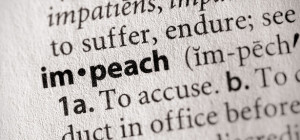I am believing now that Donald J. Trump isn’t likely to be kicked out of office before his term expires.
The nation’s founders set a high bar for removal of a president.
The U.S. House of Representatives can bring articles of impeachment. It can essentially indict a president on a complaint that he has committed “high crimes and misdemeanors.” It takes a simple majority of House members to impeach a president.
It’s happened twice. President Andrew Johnson got impeached in 1868. Then in 1998, the House impeached President Bill Clinton. The House impeached Johnson on 11 counts, the principal count being a violation of the Tenure of Office Act after he had fired Secretary of War Edwin Stanton. The House impeached Clinton on a charge that he perjured himself in testimony before a federal grand jury.
Both men were spared being kicked out. Johnson made it by a single vote in the U.S. Senate. Clinton survived much more easily in his Senate trial.
The Constitution lays out a two-thirds rule for conviction and removal from office of the president.
What makes a Trump removal so difficult lies in the numbers. Republicans control the Senate by a single seat. If they lose the Senate majority after the midterm election, it is projected that several GOP senators would need to join Democrats who likely would vote to convict the president on whatever charge is brought before the body.
I’m not certain that an impeachable offense will emerge from the investigation being conducted by special counsel Robert Mueller. If one does emerge, though, it remains a tremendously tenuous view that there would be enough political support in the Senate to actually convict the president — no matter how egregious the charge that might come forth.
Impeachment is a political process, even though members of the House and Senate state piously that they are conducting a quasi-judicial process. It really relies on the partisan leaning of both legislative bodies.
I want to offer this look at what might lie ahead for the president and for Congress.
First things first. We have an election to complete that will determine the partisan makeup of the legislative chambers that will decide what to do about this president.
Hey, you know he could just quit once he realizes his agenda — whatever it is — is going nowhere.



